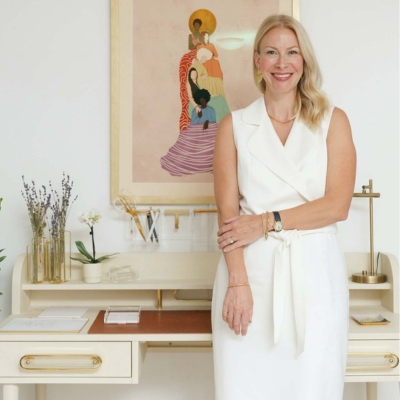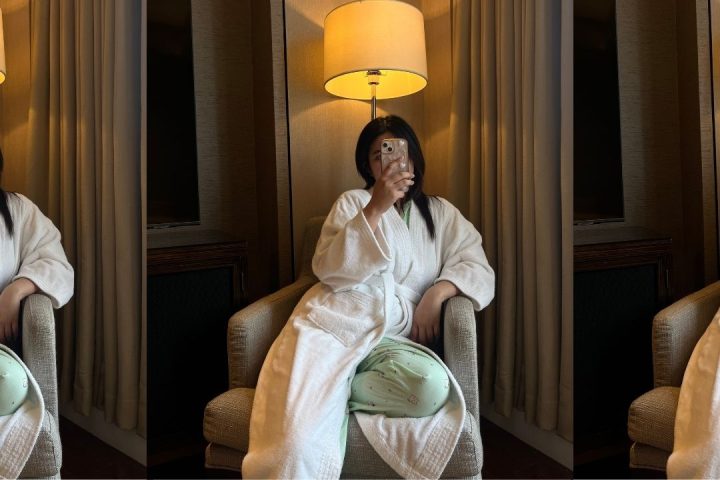I miss being a student—mostly the satisfaction of taking notes in a fresh notebook, the structure (Type A here), and not having to face the reality of the “real world” quite yet. What I wouldn’t go back for? The stress of having to follow someone else’s timeline, exams, and being graded. Take out all the negatives, and you might just learn something simply out of pure desire or enjoyment. At least that’s the premise behind TikTok creator Elizabeth Jean’s “personal curriculums,” what other TikTokers are getting behind for building consistent habits and self-improvement. Fellow creator Malgosia Kwiatek told TODAY.com she’s turned the monthly curriculum into a “ritual” that allows her to live her best life instead of scrolling through others’ lives.
And the best part? You can use these curriculums to actually improve your life. From (non-required) reading lists to manifestation and neuroscience “units” to carving out time to move your body, creating a personal syllabus means having the accountability of school without the imposition and overwhelm, and self-development without keeping score. I asked Dr. Molly Burrets, PhD, a Los Angeles-based clinical psychologist and adjunct professor at USC, to weigh in on the personal curriculum trend and how to use it to improve your life. Here’s what she had to say.
Experts Consulted
At The Everygirl, we believe that wellness advice should be grounded in accurate, science-backed information to ensure our readers can make informed decisions about their health and well-being. That’s why we prioritize consulting trusted, credible experts—so every piece of content is both reliable and empowering.

DR. MOLLY BURRETS, PhD
Dr. Molly Burrets is a licensed clinical psychologist and an adjunct professor at University of Southern California in the Department of Marriage and Family Therapy. With 16 years of experience practicing psychotherapy, conducting psychological research, and teaching psychology at the undergraduate and graduate levels, she specializes in treating couples seeking greater connection and less conflict, as well as women experiencing anxiety, depression, and reproductive concerns.
The “Personal Curriculum” Trend as Self-Improvement
As someone who lives and breathes wellness (and reports on it), I brushed off the “personal curriculum” as just another TikTok trend masking optimization, fueling the need to always be bettering ourselves. But for people who thrive on order (ahem, me) or crave some structure, it can inspire purpose while fostering passions you didn’t know you had. With the right intention, creating a personal curriculum for yourself can be a fun, self-guided approach to personal growth and self-development, Dr. Burrets pointed out. “It creates intentional space for reflection, growth, and nurturing yourself, and it provides a structured way to expand your skills, knowledge, and self-awareness. It’s a combination of goal-setting and the more restorative aspect of focusing inward.”
Giving yourself a monthly curriculum is a way to reclaim routine on your own terms. Whatever particular self-improvement theme or skill you focus on each month (think: mindfulness, gut health, boosting your confidence) and whether you use books, podcasts, online courses or workshops, journaling prompts, or challenges around a particular topic (see: The Everygirl’s Best Self Syllabus), you dictate what you learn and how. Unlike the pressure of New Year’s resolutions that often call for rigid, major overhauls, a monthly curriculum is realistically doable. “Instead of setting vague long-term resolutions, this monthly curriculum gives you a structured, yet flexible ‘mini-course’ to take each month,” Dr. Burrets said. “Dedicating one month to a specific area of [self-improvement] interest can help you focus on the goal without becoming overwhelmed. It’s only a month, after all, and it’s at your own pace.”
How to Use It to Improve Your Life
The only thing I have to show for taking woodshop and calculus is a crooked CD case and distressing flashbacks. What I really could’ve used in high school or college is a course in adulting—one that gave me practical know-how I could actually apply IRL. Case in point: financial planning (because financial health is wellness, and buying matcha lattes from Erewhon is my weakness). Dr. Burrets said a personal curriculum is a great jumping off point for building a habit: “If you’re ‘studying’ how to become more financially literate, for example, you may develop healthier habits of saving money or putting some money into an investment account each month. That’s a win-win, because the lessons you practice during a monthly curriculum can carry over into your everyday life, long after the month is over.” Or, maybe you could use a lesson plan or two in sleep hygiene or a full quarter on how to combat anxiety.
While it might seem like class is in session for everyone on TikTok (and they’re all acing their subject matters with ease), you’re the one to grade your own progress, so be realistic with how much you can do and give yourself credit for every step forward. For us overachievers, it means avoiding burnout from spreading ourselves too thin with an impossible schedule to follow and feeling like a failure. “Don’t overload your curriculum in a way that it becomes more overwhelming than supportive,” Dr. Burrets warned. Decide on one how-to book to read throughout the month or incorporate one or two daily practices instead of overhauling your routine. The point is not to curate a “perfect” curriculum that looks good on social media, but in the words of the #curriculumclub president herself, it’s about coming back to ourselves and “being curious about our world.”

Katherine Chang, Wellness Staff Writer
Katherine Chang is The Everygirl’s Wellness Staff Writer with over five years of experience in the health and wellness space. She navigates the latest wellness topics and trends through expert interviews and studies, and she’s always first in line to try them firsthand.
The post How to Use The ‘Monthly Curriculum’ Trend to Transform Your Life in One Month appeared first on The Everygirl.
Source: Cosmo Politian











